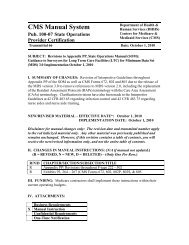LOUISIANA Community Mental Health Services Block Grant ...
LOUISIANA Community Mental Health Services Block Grant ...
LOUISIANA Community Mental Health Services Block Grant ...
You also want an ePaper? Increase the reach of your titles
YUMPU automatically turns print PDFs into web optimized ePapers that Google loves.
eviews of proprietary and open-source systems, analyses of the pros and cons of various approaches<br />
to an EBHR, consultations with other states and a readiness assessment of the human and technical<br />
infrastructure needed to implement a system. Five approaches to an EBHR were reviewed: 1.) To<br />
continue to build and to integrate state-custom built systems; 2.) to procure a commercial system; 3.)<br />
to procure an open source system; 4.) to implement a hybrid of an open source and proprietary<br />
system; 5.) to allow each region/ LGE establish its own system. The pros and cons of each approach<br />
were reviewed in terms of cost of acquisition and implementation, the implementation timeline, and<br />
important features such as interoperability, certification, and infrastructure requirements. Priority<br />
system features were identified. It was determined that OBH should consider pursuing an open<br />
source/ hybrid solution as the most cost effective approach. OMH participated in two national<br />
meetings facilitated by NDIIC and dialogued with other states regarding implementation strategies in<br />
coordination with a national SAMHSA effort to develop a model for an EBHR. Based on analyses,<br />
NDIIC recommended that OBH proceed with establishing the necessary project staffing and conduct<br />
a Request for Information (RFI) for candidates that fit the identified prioritized state needs. The<br />
responses to the RFI will provide cost estimates to be determined that would enable OBH to prepare a<br />
budget for the coming fiscal year and an RFP to procure the desired system. The LA EBHR initiative<br />
is laying a firm foundation for the agency to make strides forward towards an integrated electronic<br />
client record in the coming fiscal year as the Office of Behavioral <strong>Health</strong> is operationalized.<br />
As information technology advances, OMH continues to operate several legacy systems until these<br />
are systematically replaced by OMH-IIS or by an integrated electronic record system. These legacy<br />
systems continue to provide needed performance data for service system planning and monitoring.<br />
OMH legacy systems are largely custom-built, LAN-based, and compliant with national data<br />
standards (e.g., <strong>Mental</strong> <strong>Health</strong> Statistics Improvement Program - MHSIP). These legacy systems<br />
include:<br />
PIP/PIF/ORYX. The Patient Information Program, implemented in 1992, operates in each of the state<br />
hospitals and regional acute units, providing a comprehensive array of data on all inpatients served.<br />
Together with OMH-IIS, it is the primary source of counts of persons served, diagnoses, lengths of<br />
stay, and bed utilization. The financial module (PIF), implemented in 1994, supports billing and<br />
accounts receivables, and the ORYX module, implemented in 1999, supports performance reporting<br />
for Joint Commission accreditation. PIP has been upgraded to include collection and reporting of the<br />
new Joint Commission core measures, for reporting of screening (trauma, substance abue),<br />
medication management (antipsychotic monotherapy), and continuity of care (reducing the time for<br />
needed care information to be sent to the aftercare service unit). The OMH-IT strategic plan<br />
identifies PIP/PIF/ORYX to be the next legacy system to be integrated into OMH-IIS. The state<br />
hospital and regional inpatient units are also included in plans for an integrated electronic behavioral<br />
health record system.<br />
MHR/ MHS & UTOPiA. The <strong>Mental</strong> <strong>Health</strong> Rehabilitation/<strong>Mental</strong> <strong>Health</strong> <strong>Services</strong> system,<br />
implemented in 1995, supports client, assessment, and service data collection and reporting for<br />
Medicaid mental health rehabilitation provider agencies (MHR) and for some OMH contracted<br />
mental health service program providers (mainly case management) (MHS). The Utilization,<br />
Tracking, Oversight, and Prior Authorization (UTOPiA) system supports prior authorization of<br />
services and utilization and outcomes management at the state and area levels. The system is now<br />
being utilized in OMH in the PASSR program providing data on mental health needs in the nursing<br />
homes. MHR/MHS & UTOPiA both run in Visual Fox Pro. As of July 1, 2009, the <strong>Mental</strong> <strong>Health</strong><br />
Rehabilitation <strong>Services</strong> Unit has been transferred to the Medicaid Office in DHH. As such, the MHR<br />
version of MHR/MHS is be maintained and further developed within the Medicaid Integrated Data<br />
PART C <strong>LOUISIANA</strong> FY 2011 PAGE 225<br />
SECTION III: ADULT & CHILD/ YOUTH PLAN – CRITERION 2<br />
MENTAL HEALTH SYSTEM DATA EPIDEMIOLOGY - INCIDENCE & PREVALENCE ESTIMATES
















